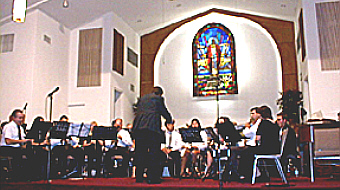![]()
General Board of Global
Ministries
![]()
UM Information
![]()
UM Reporter
![]()
![]()
Favorite Places
![]()
![]() Florida Southern College
Florida Southern College
![]()
![]() Bethune Cookman College
Bethune Cookman College
![]()
![]() FL
UM Children's Home
FL
UM Children's Home
|
|
Revisioning leads healthy church in new directions |
|
Oak Grove United Methodist Church in Tampa featured a concert June 27 by the Tampa Bay Winds and Friends, a 50-piece symphonic band that includes the church's minister of music, Michael Bleau, and members of the church's praise band, the Instruments of the Kingdom. The church's sanctuary recently underwent a face lift to make room for elements of contemporary worship and events like the concert. |
| By Michael Wacht TAMPA — With an average Sunday worship attendance of between 225 and 250 people from a variety of age groups, 120-year-old Oak Grove United Methodist Church here appears to be a healthy church with no pressing need to rethink its approach to ministry. But the church is now in its second year of a revisioning process with the Percept Group and the Florida Conference Office of New Church Development and Church Redevelopment, and the Rev. Richard Paul says things are changing for the better. The church’s members did not like what they saw when they took a good look at the church’s membership numbers in February 1997, according to Paul. Although the figures were not a cause for alarm, members noticed they had been losing 65 to 70 members "by attrition" during each of the past four years, he said. Families were moving away from the urban area around the church to the suburbs of Tampa. Although many initially maintained their membership at the church, most eventually transferred to churches that were closer or where their children’s friends attended. The neighborhood around the church was also changing, Paul said. Several years ago, the community was made up of mostly traditional, blue-collar, Anglo families. Today, according to the demographic study provided by Percept, 40 percent of the people living within four miles of the church are Hispanic and 30 percent are single parents. "The church saw that its focus and area of ministry were changing in scope," he said. That’s when the church invited the Percept group to help them redefine what ministry meant in their context. Through demographic studies, member surveys, Bible studies and revisioning workshops, Percept helped church members create new vision and mission statements for the church and yearly lists of things to do to fulfill the vision and mission. One of the first changes Paul saw was a shift in leadership from older to younger members. "People had moved away, and the older people felt they didn’t want to get heavily involved," Paul said. "Now it’s the younger group of leaders that are picking up the ball and running with it. The Percept thing helped…the younger people to get involved to see their vision fulfilled, not to fulfilling someone else’s vision." Now, Paul says evidence of the change is apparent throughout the church. Physical changes have been made to accommodate newer models of ministry. The church recently made its 6'-deep traditional chancel area a 20' x 30' stage designed to accommodate a newly-formed drama group, sacred dance team and 50-piece symphonic band. Two new programs have also been implemented as a result of the revisioning process. One, the Jehovah Java Coffeehouse ministry, was the vision of two members, Diego Perez, a musician and chairman of the church’s worship team, and Scott Metts, who wanted to reach young adults in the community. The coffeehouse is held the first Saturday of every month from 7 to 11 p.m. in the church’s fellowship hall. There is no charge, and a team of volunteers provides coffee and snacks. Entertainment has included a local Christian band, a disc jockey playing popular Christian music, games and conversation. Paul says Jehovah Java has given singles and young adults in the church a chance to meet and get to know each other "in a low-key atmosphere…which is something they needed and really enjoy." It has also begun to attract people from another local singles ministry that no longer meets. The second ministry is the Pioneer Club, a Wednesday night ministry for kids in kindergarten through fifth grade that is a "‘mixture of Sunday school and scouting," Paul says. It started with only four or five children, who were mostly brought by parents already involved in Wednesday night choir practice or Bible study. Through word of mouth, news of the program has spread to people outside of the church, and the ministry now has approximately 20 kids. "We have high expectations from that program for next year," Paul said, adding the church is planning to do a simultaneous program for parents so they don’t have to drop off their kids, go home and return to pick them up. Paul says he is excited that new ministries are growing and creating ideas for more programs. "The neat thing about a program like this is you start to see it work, then you start to see it open doors in other areas," he said. Top
of this page |

